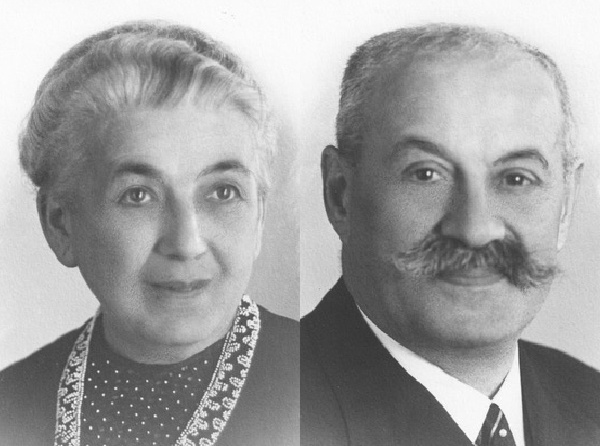Hermann and Amalie Kohn biography

Dr. Harold Kohn's grandparents, Hermann and Amalie Kohn, were from the Lower Franconia district of Bavaria in Germany. They and their ancestors had lived there since the 1750s.
Hermann Kohn was born on April 2, 1871, in Lulsfeld, and Amalie (nee Schwab) two years later on January 21, 1873, in Rimpar. They both perished on May 28, 1943, in Sobibor, a Polish concentration camp.
Though we have little information about Hermann's and Amalie's early lives, we can know them and their values through their two children, Rosl and Karl, Harold’s aunt and father. Both were strong, independent individuals, courageous in their actions and true to the purpose and principles they drew from their parents. For Rosl and Karl, it was difficult to talk about the past; their desire was to look to the future. Harold and his sisters learned from Karl that his parents were industrious and loving. Their family, their Jewish faith, and their business were their guideposts. Germany was their home, but with the rise of the Third Reich, they lost their voices and their rights, then their home, and finally they saw their family destroyed. With justice denied, their aspirations were dashed and their values trampled.
We know that Hermann and Amalie Kohn both came from large families; Hermann had 8 siblings and Amalie had 5. In 1899, with the help of his father, Hermann bought a local hardware and tool company in the neighboring town of Gerolzhofen. He rapidly expanded the concern to several adjacent buildings from which he provided tools, machinery, and tool repairs to local farmers and businesses and household goods, such as cutlery, sewing machines, washing machines, and clothes presses to the community. Hermann married Amalie Schwab in 1900. Their daughter, Rosl, was born in 1901 and their son, Karl, in 1907.
Rosl married Ludwig Loewenthal in 1927 and moved to Bad Kissingen, where Ludwig was a banker. Rosl and Ludwig, with their son, Willi, emigrated to the Netherlands in 1933 after Ludwig was targeted by the National Socialists for his outspoken political views. Recognizing the clear threat, Hermann secured a visa in 1936, to allow son Karl to emigrate to the United States. Hermann and Amalie remained in Gerolzhofen; however, conditions became increasingly intolerable for Jewish citizens.
In early 1939, the Kohns moved to Amsterdam, near Rosl and her family, intending to follow their son to the U.S. But, in May of 1940, Germany invaded the Netherlands and all hope vanished. In May 1943, the Kohns and the Loewenthals were arrested. That same month, the Kohns were sent to Westerbork, a transit camp, for processing by the Nazi government and then were deported to Sobibor, an extermination camp in Poland, where they were immediately killed. Hermann was 72, and Amalie was 70.
The Directors of the Kohn Charitable Trust are privileged to honor them by endowing the Hermann and Amalie Kohn Professorship of Social Justice and Social Policy in the Gerald R. Ford School of Public Policy at the University of Michigan. We provide these funds to address issues of social justice in this country so others may not lose their voices and roles in our society and, thereby, we may all benefit from their collective experience and wisdom.
Written by Dr. Harold and Carol Kohn, Directors Kohn Charitable Trust
